Groundbreaking FDA Approval of ZEVASKYN for RDEB Treatment

Abeona's ZEVASKYN Receives FDA Approval for RDEB
- ZEVASKYN addresses a crucial need for patients suffering from a severe skin disorder with no known cure.
- The approval was granted following the Phase 3 VIITAL™ study, demonstrating ZEVASKYN's efficacy in wound healing and pain relief.
- Availability is projected for the third quarter of 2025 at designated Qualified Treatment Centers.
- The Abeona Assist™ program will support eligible patients and families throughout the treatment process.
- A Rare Pediatric Disease Priority Review Voucher (PRV) was awarded by the FDA, enhancing the importance of this achievement.
Abeona Therapeutics Inc. announced that the U.S. FDA has given the green light to ZEVASKYN™ (prademagene zamikeracel), marking it as the first autologous cell-based gene therapy aimed at treating wounds in individuals with recessive dystrophic epidermolysis bullosa (RDEB). This chronic skin condition is characterized by its debilitating effects, and there is currently no established cure.
CEO Vish Seshadri emphasized the approval as a transformative moment for the RDEB community, responding directly to the critical needs expressed by patients and families affected by this disorder. He highlighted that ZEVASKYN offers a new opportunity for significant wound healing and relief from pain with just one surgical application.
Evidence from Clinical Trials Supporting ZEVASKYN
The pivotal Phase 3 VIITAL™ study served as the foundation for the FDA’s approval of ZEVASKYN. The trial's multi-center, randomized, intrapatient-controlled design demonstrated that ZEVASKYN significantly healed over 50% of large chronic wounds in adult and pediatric patients. The first co-primary efficacy endpoint was met with remarkable success, showing an 81% healing rate in the treated wounds compared to just 16% in control cases.
Jean Tang, lead investigator of the study, noted that the therapy demonstrated acceptable tolerability and efficacy, leading to tangible improvements in patients' conditions. Reported adverse events were minor and limited, primarily consisting of procedural pain and itch.
In earlier studies, ZEVASKYN showed sustained improvement over a substantial follow-up period, reinforcing the therapy's long-term benefits for its users. Such promising data strengthens the case for using ZEVASKYN as a preferred treatment option for challenging RDEB wounds, which can lead to infections and complicate even standard healing processes.
Abeona’s Commitment to RDEB Patients
Abeona Therapeutics is committed to ensuring the accessibility of ZEVASKYN to those who need it most, planning to collaborate with health care payers for effective delivery of this innovative therapy. The company aims to execute outcome-based agreements to enhance patient access and support for the extensive needs of the RDEB community.
Brett Kopelan from debra of America highlighted the positive impact that ZEVASKYN could have on elevating the quality of life for individuals with severe chronic wounds, suggesting that it can address previously unmanageable aspects of their condition and enhance daily living experiences.
Additionally, following approval, the company expressed their appreciation for the contributions made by patients, families, and clinical researchers during this extensive development journey. Their collaborative efforts were crucial in navigating the complex regulatory landscape and achieving this significant milestone.
The Innovative Mechanism of ZEVASKYN Therapy
ZEVASKYN operates by utilizing the patient's own skin cells that are genetically modified to produce Type VII collagen, a vital component missing in RDEB patients. This targeted approach allows for precise treatment focused on restoring normal function to the skin, directly addressing the underlying cause of this debilitating condition.
Patients can receive treatment through one surgical application where the modified skin cells, prepared as sheets, are applied to the affected areas, offering extensive coverage for multiple wounds if necessary.
Looking forward, Abeona is poised to continue its journey of innovation in gene therapy, promising advancements not just for RDEB but potentially for a range of other genetic disorders in the pipeline.
Frequently Asked Questions
What is ZEVASKYN?
ZEVASKYN is an autologous cell-based gene therapy that treats wounds in patients with recessive dystrophic epidermolysis bullosa (RDEB).
How does ZEVASKYN work?
It uses genetically modified skin cells to produce Type VII collagen, which is crucial for healing RDEB wounds.
When will ZEVASKYN be available?
ZEVASKYN is projected to be available starting in the third quarter of 2025.
Who can benefit from ZEVASKYN?
Both adult and pediatric patients suffering from RDEB and its chronic wounds can benefit from this therapy.
How can patients access support for ZEVASKYN treatment?
Abeona Assist™ provides personalized support for patients and families, including guidance with insurance and financial assistance options.
About The Author
Contact Logan Wright privately here. Or send an email with ATTN: Logan Wright as the subject to contact@investorshangout.com.
About Investors Hangout
Investors Hangout is a leading online stock forum for financial discussion and learning, offering a wide range of free tools and resources. It draws in traders of all levels, who exchange market knowledge, investigate trading tactics, and keep an eye on industry developments in real time. Featuring financial articles, stock message boards, quotes, charts, company profiles, and live news updates. Through cooperative learning and a wealth of informational resources, it helps users from novices creating their first portfolios to experts honing their techniques. Join Investors Hangout today: https://investorshangout.com/
The content of this article is based on factual, publicly available information and does not represent legal, financial, or investment advice. Investors Hangout does not offer financial advice, and the author is not a licensed financial advisor. Consult a qualified advisor before making any financial or investment decisions based on this article. This article should not be considered advice to purchase, sell, or hold any securities or other investments. If any of the material provided here is inaccurate, please contact us for corrections.

